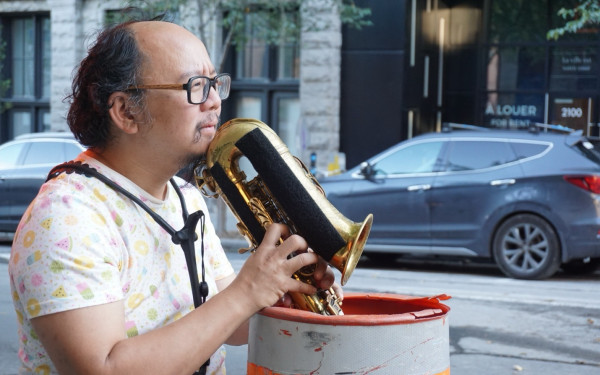FASA, Concordia Student Union Hold Talk on Exploitation in the Arts
Panel Part of CSU’s Ongoing Unpaid Internships Campaign
Unpaid labour is an issue across many industries but it takes specific forms in the arts.
There are different forms of exploitation that occur in the visual arts ranging from unstable working conditions, unpaid internships that are often a requirement of arts degrees, and the idea that “exposure” is equal to financial compensation. There is also the emotional labour of creating artwork that is not only personal but comes with the additional burden of putting it out in the world to be judged, and counting on it as your livelihood.
Curator Amber Berson was one of three speakers featured at a panel discussion on March 15. The panel was a collaboration between the Fine Arts Student Alliance and the Concordia Student Union, as part of the CSU’s ongoing campaign against unpaid internships.
Berson discussed some of the barriers artists face which can include financial barriers, being a person of colour or being a parent.
Being a parent is something that affects her the most. She cited an example of when she was invited and then uninvited to speak about feminist administrative practices.
“I was told to leave a presentation because I had to bring my four-month-old child and I was the one presenting,” said Berson. According to Berson, the attendees of that talk were horrified she brought her baby along.
She mentioned the organization Cultural Reproducers as being a valuable resource. She explained that it compiles opportunities for “people who find it difficult to access the art world because they are parents.”
FASA General Coordinator Cleopatra Boudreau moderated the discussion. In an interview, Boudreau said that she views being able to study art in university as a privilege.
As a result she feels that she has a responsibility to turn down unpaid work in certain situations, so that it may someday lead to someone with less privilege being paid for theirs.
“What I’ve been thinking about as a person and artist is valuing my own work and deciding for myself what I’m worth and establishing that I have the option to say no,” she said.
According to Boudreau, it is important for those who are in power, especially men, to talk about and fight for these issues. She thinks another way to combat the issue of artist exploitation is to pay your friends when working on a creative project together.
“If I’m not going to pay them who will?” said Boudreau.
Roxane Halary, a representative of Studio XX, a feminist artist-run centre, has experience in theatre and production.
“Oftentimes, I see people applying for so much money to actually build the set, but there is no money to actually pay people,” she said in an interview.
She noted the importance of curators and event creators needing to find the funding to pay their artists. She mentioned the principle of how DIY music festivals operate even when they have no funding—that all the money from the door will be split among invited artists.

_900_636_90.jpg)


_600_375_90_s_c1.jpg)

_600_375_90_s_c1.jpg)
2_600_375_90_s_c1.jpg)